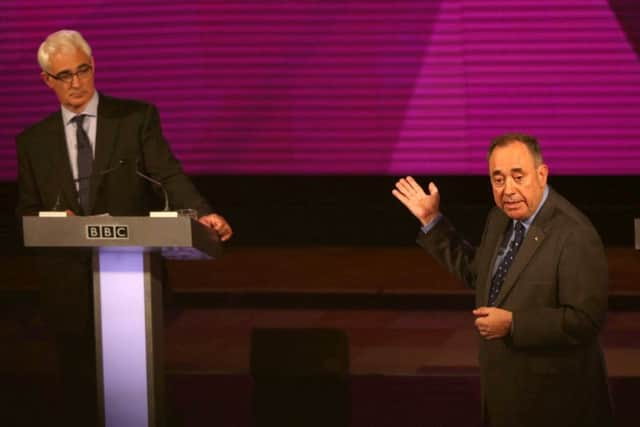Alex Salmond admits jokes on indyref TV debate backfired
The latest part of a BBC documentary series on the historic independence vote also sees Salmond’s advisers tell of their “devastation” at the debate, with one admitting he had his “head in his hands”.
From the launch of the Scottish Government’s White Paper, the row over George Osborne’s claim that Scotland would not have the pound, as well as the rise of social media abuse, the programme hears from leading lights from both campaigns.
Advertisement
Hide AdAdvertisement
Hide AdOne of the biggest revelations is Salmond admitting he got his tactics wrong in the first live debate.


According to his adviser, Geoff Aberdein, it was Alex Salmond’s idea to counter the Better Together campaign’s “Project Fear” by using humour in the debate. So while Alistair Darling interrogated him on a “Plan B” for an independent currency, Salmond asked about driving on the right-hand side of the road, and an independent Scotland being more susceptible to attack from outer space.
Salmond says: “The No campaign was based on fear, causing as much fear and apprehension and doubt as they could. One way to deal with it is humour, to ridicule it, reduce it to absurdity.
“It’s like having a great idea last thing at night that’s not so great an idea in the morning. Perhaps at that time in the debate we were not quite there yet. Perhaps it was a tactic for a wee bit later on.
“So that was a mistake doing that.”
Aberdein agrees. “He got stuck on this silly story stuff. People watching it thought ‘Why is he talking about this? This is his moment to talk about independence. I thought – we’re in trouble.’
“I was so devastated and I didn’t want people to see me devastated, so I went into an adjacent auditorium and put my head in my hands in a darkened room for about 40 minutes.”
Former Chancellor of Exchequer, Alistair Darling, also recalls the debate: “You’re preparing for the debate and you ask yourself what’s the character of your opponent? Salmond comes across as being extremely self-confident, pompous at times. There’s two ways to deal with that – one is being rude and the other is try and prick the bubble.
“I could see the Plan B thing [on currency] was working because he patently hadn’t got one. Normally he’s a confident debater but he wasn’t that night. When he started asking about space I thought he’d lost the plot.”
Advertisement
Hide AdAdvertisement
Hide AdThe programme also lays bare the extent of the abuse that both campaigns received. Former Scottish Labour leader Jim Murphy and SNP MP Mhairi Black both describe what it was like on Scotland’s streets, while TV historians Tom Holland and Dan Snow talk of the “relentless” nature of the trolling they received on social media after they launched the celebrity campaign Let’s Stay Together.
Snow says: “I would love to say that I found it bracing and it only strengthened my resolve, but it was brutal.”
On the other side, the head of digital with Yes Scotland, Stewart Kirkpatrick, says while he too was subjected to abuse – “I certainly got my fair share of people hoping I would die in a fire” – he admits the “cybernats” were not helpful to the campaign.
Wings over Scotland blogger Stuart Campbell says: “Other countries’ independence campaigns have waded knee-deep in blood. All we did was occasionally call each other some names on Twitter.”
Yes/No Inside The Indyref is on BBC Scotland, Tuesday, 10pm